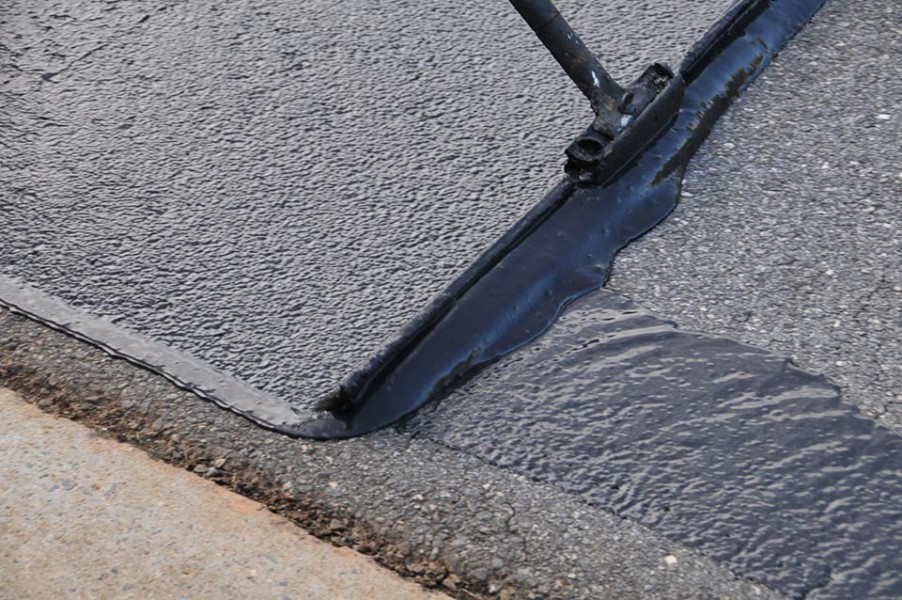Optimize Longevity: Hot Mix Asphalt Sealing for Angled Parking Structures
Warm Mix Asphalt: A Lasting Service for Sidewalk
Warm Mix Asphalt (HMA) has actually emerged as a leading lasting option for sidewalk options, providing a myriad of ecological advantages and innovative modern technologies. As the demand for eco-friendly building and construction methods expands, exploring the subtleties of HMA's sustainability can provide beneficial insights right into the future of pavement options.
Environmental Advantages of Hot Mix Asphalt

In Addition, Warm Mix Asphalt helps to alleviate urban heat island impacts. Its dark color takes in sunshine, minimizing the quantity of heat reflected back right into the atmosphere contrasted to lighter-colored pavements. This can reduce ambient temperatures in city areas, lowering the need for air conditioning and eventually minimizing power consumption.
In enhancement, Warm Mix Asphalt adds to boosted stormwater monitoring. Its porous nature permits water to penetrate the sidewalk and charge groundwater supplies, decreasing overflow and the threat of flooding. These environmental advantages make Warm Mix Asphalt a sustainable choice for leading roadways and highways.
Energy Efficiency in HMA Manufacturing
Is energy performance an important aspect in the manufacturing of Hot Mix Asphalt (HMA)? Power plays a considerable role in the manufacturing of HMA, affecting both expense and ecological sustainability. One key facet of power efficiency in HMA production is the usage of warm mix asphalt (WMA) modern technologies.
Furthermore, advancements in plant innovations have led to more energy-efficient HMA manufacturing procedures. By maximizing energy use in HMA manufacturing, the sector can decrease its carbon footprint while keeping top quality sidewalk products.
Recyclability of Hot Mix Asphalt
The recyclability of Warm Mix Asphalt (HMA) is a pivotal aspect of its sustainability and long-term environmental effect. HMA is just one of one of the most recycled products in the United States, with over 100 million bunches of redeemed asphalt sidewalk (RAP) being recycled annually in brand-new sidewalk building and construction. Recycling HMA offers a number of ecological advantages, such as reducing the need for virgin materials, lowering energy consumption during production, and lowering the amount of waste sent out to landfills.
The process of recycling HMA includes crushing the existing pavement, crushing it right into smaller sized pieces, and mixing it with new accumulation and asphalt binder to develop a recycled mix. In general, the recyclability of HMA plays a significant duty in advertising sustainable techniques within the sidewalk market.

Long-Term Efficiency of HMA
Asphalt sidewalks demonstrate resilience and durability over an extended duration, showing the lasting efficiency of Warm Mix Asphalt (HMA) Furthermore, improvements in HMA innovation, such as the usage of polymer-modified binders find here and cozy mix asphalt, have better improved the longevity and long see this life of HMA pavements. By focusing on high quality construction and upkeep methods, HMA proceeds to confirm itself as a cost-efficient and sustainable remedy for lasting pavement framework.

HMA: Resilience and Sustainability
Showing both sturdiness and sustainability, Warm Mix Asphalt (HMA) has come to be a cornerstone in the building and construction of durable sidewalk frameworks - angled parking. HMA's durability stems from its ability to hold up against heavy loads, severe climate condition, and high web traffic volumes, making it a trusted selection for roads, highways, and flight terminal runways. The composition of HMA, which generally includes aggregates, binder, and filler, plays a critical role in boosting its durability and resistance to damage
In addition, HMA's sustainability exists in its recyclability and energy-efficient production procedure. The capability to reuse reclaimed asphalt pavement (RAP) in new HMA mixtures reduces the demand for virgin products and minimizes the ecological impact check out this site of sidewalk building and upkeep. Furthermore, the energy effectiveness of producing HMA hinges on its lower blending temperature levels contrasted to other pavement products, leading to reduced power usage and greenhouse gas emissions.
Verdict
To conclude, hot mix asphalt (HMA) offers a sustainable option for pavement with its environmentally friendly qualities. HMA's recyclability, energy effectiveness in production, and long-term longevity make it an environment-friendly selection for roadway construction. By conserving natural sources, reducing waste, and reducing greenhouse gas emissions, HMA plays an important duty in advertising sustainability in framework growth. Its capacity to alleviate urban warm island impacts further underscores its importance in creating environmentally aware and resilient sidewalk systems.
HMA is one of the most recycled products in the United States, with over 100 million loads of redeemed asphalt sidewalk (RAP) being reused yearly in brand-new sidewalk building.The process of reusing HMA includes milling the existing pavement, crushing it right into smaller pieces, and mixing it with new accumulation and asphalt binder to create a recycled mix.Asphalt pavements demonstrate toughness and durability over a prolonged duration, showing the long-term performance of Warm Mix Asphalt (HMA) In addition, developments in HMA technology, such as the usage of polymer-modified binders and cozy mix asphalt, have even more boosted the sturdiness and long life of HMA pavements. The ability to reuse recovered asphalt sidewalk (RAP) in new HMA combinations reduces the demand for virgin materials and lessens the environmental influence of pavement construction and maintenance.